Recorded March 9 & 10, 2024; published Saturday March 23, 2024
Program Order:
Aus der Tiefen rufe ich, Herr, zu dir …….. Johann Sebastian Bach (1685-1750)
- Sinfonia e Coro
- Aria con Corale (featuring Darrell J. Jordan, baritone)
- Coro
- Aria con Corale (featuring Stephen Rumph, tenor)
- Coro
Featuring:
Dawn Posey, violin
Kimberly Rosenberg, violin/viola
Lauren Hall, viola
Laura Kramer, cello
Ross Gilliland, bass
Elizabeth Brown, archlute
Stephen Rumph, tenor
Darrell J. Jordan, baritone
Janet Putnam, oboe
For a Breath of Ecstasy ……………………………… Michael John Trotta (b. 1978)
- Wealth Enough for Me
- Peace Flows Into Me
- Who Gave My Soul to Me
- For You I am Still
- Spend All You Have on Loveliness
- And I For You
- Let Me Love
Featuring:
Dawn Posey, violin
Kimberly Rosenberg, violin/viola
Lauren Hall, viola
Laura Kramer, cello
Janet Putnam, oboe
Program Notes
This concert seeks to highlight the emotive power of the human voice to express two very different kinds of “crying.” On the one hand, the cantata Aus der Tiefen rufe ich, Herr, zu dir (“From the Depths, Lord, I Cried To Thee”) by Johann Sebastian Bach, features a voice crying out in anguish, wallowing in human frailty and imperfection. In contrast, John Michael Trotta’s For a Breath of Ecstasy depicts cries of joy, laughter, and song from a voice that is simultaneously empowered by love and alive with wonder.
Most of the surviving cantatas by Johann Sebastian Bach (more than 300) are
from later in his career and were written in Leipzig during his tenure working at a
Lutheran school and four sister churches. These later cantatas were written for
specific days of the church calendar, and typically each cantata’s various movements were embedded within the Lutheran church service. Bach’s Leipzig output shows the influence of Italian opera, with arias and “speech-like” singing that required trained soloists. In contrast, Bach’s early cantatas are unique in his output as they were written in a “motet” style, imitating the contrapuntal achievements of Renaissance composers and are favorites among modern choral performing organizations.
Aus der Tiefen rufe ich, Herr, zu dir is one of these rare early works, written
between 1708-1709 while Bach worked at the Divi Blassi church in Mühlhausen.
The text for Aus der Tiefen comes from Psalm 130, and Bach likely wrote it as
part of a penitential memorial after a large fire destroyed part of the town. Bach
chose to set the first three movements in a particularly somber tone. The first
movement features the title text, and Bach aptly crafted a descending motive with a
low melodic range as the chorus cries out for mercy from the depths. The second
movement features two newly composed rhythmic lines juxtaposed against a slow
sustained pre-existing tune, a common compositional practice held over from the
Renaissance era. The bass soloist’s text is from Psalm 130, whereas the choir’s slowmoving line contains music and verses from a hymn that any Lutheran churchgoer would have recognized. In the third movement, Bach continues the dark mood in the distant key of F minor with a long descending line “Meine seele harret” (“My soul waits), and the relentless dissonances illustrate the sorrow and anguish that is at the core of Psalm 130. In contrast, the fourth movement represents a shift to a more hopeful tone; it features a tenor soloist and the choir once again sings a
chorale tune. The tenor aria features a dance-like meter and lilting rhythmic line,
and the choir’s hymn verse highlight’s God’s healing power. The final movement
is a compositional wonder with multiple musical lines overlapping to create an incredibly exciting and complex fugal passage. The text speaks to the belief in
redemption through Jesus, and absent are the descending and mournful melodic
contours of the first movement, and instead Bach weaves together a magnificent
array of lively and energetic motives.
- Sinfonia e Coro
Aus der Tiefen rufe ich, Herr, zu dir.
Herr, höre meine Stimme,
laß deine Ohren merken
auf die Stimme meines Flehens! - Aria con Corale
Soloist:
So du willst, Herr, Sünde zurechnen,
Herr, wer wird bestehen?
Choir:
Erbarm dich mein in solcher Last,
nimm sie aus meinem Herzen,
die weil du sie gebüßet hast
am Holz mit Todesschmerzen,
Soloist:
Denn bei dir ist die Vergebung,
daß man dich fürchte.
Choir:
auf daß ich nicht mit großem Weh
in meinen Sünden untergeh,
noch ewiglich verzage. - Coro
Ich harre des Herrn,
meine Seele harret,
und ich hoffe auf sein Wort. - Aria con Corale
Soloist:
Meine Seele wartet auf den Herrn
von einer Morgenwache bis zu der andern.
Choir:
Und weil ich denn in meinem Sinn,
wie ich zuvor geklaget,
auch ein betrübter Sünder bin,
den sein Gewissen naget,
und wollte gern im Blute dein
von Sünden abgewaschen sein
wie David und Manasse. - Coro
Israel, hoffe auf den Herrn;
denn bei dem Herrn ist die Gnade
und viel Erlösung bei ihm.
Und er wird Israel erlösen
aus allen seinen Sünden.
Out of the depths I cry, Lord, to you.
Lord, hear my voice,
let your ears hearken
to the voice of my supplication!
Soloist:
If you, Lord, were to ascribe our sins,
Lord, who would endure?
Choir:
Have mercy upon me under such burden,
remove it from my heart,
because you have atoned for it
on the wood in pangs of death,
Soloist:
Yet in you there is forgiveness
that one might fear you.
Choir:
so that I under the immense woe
of my sins might not perish,
nor eternally despair.
I wait upon the Lord,
my soul waits,
and I hope in his word.
Soloist:
My soul waits upon the Lord
from one morning’s watch to the next.
Choir:
And I then, having long lamented,
understanding that I too
am a miserable sinner
whose conscience gnaws at him,
would gladly be cleansed of sin
by your blood
like David and Manasseh.
Israel, hope in the Lord,
for in the Lord there is mercy
and full redemption through him.
And he will redeem Israel
from all its sins.
Michael John Trotta’s For a Breath of Ecstasy draws all of its texts from “Love Songs,” an anthology celebrating the American poet Sara Teasdale (1884-1933). Each of Teasdale’s seven poems that Trotta selected for this work invoke love and companionship in some capacity, and nearly all of them mention singing or music. Trotta chose to arrange his composition into a musical palindrome, where the first and last movements contain nearly the same music, as does the second and sixth movements and the third and fifth movements, respectively. The first and last movements both open with an expansive oboe melody against a backdrop of flourishes from the strings. The choir then echoes the tuneful song, breaking out of their narrow melody into an expansive and high-range unison cry of joy. In the second and sixth movements, the texts employ metaphors from the natural world. In the second movement, after a peaceful opening Trotta selects a slow-moving melody for the sopranos and altos accompanied by a rhythmic tenor and bass line. Trotta reprises the same treble melody in the sixth movement but this time to a backdrop of syncopated strings. The third and fifth movements are both for reduced choral forces, and the texts of both movements examine the act of giving: in the former, the low voices sing of what one gives and receives in a relationship, whereas in the latter the treble voices sing universally of what life has to offer.
Only the fourth movement, written for a cappella voices, features music that is not
repeated in any other movement, and thus represents a musical turning point or line of symmetry. For this pivotal movement Trotta selects the most intriguing text of the entire work. The poet describes that in past relationships they sang songs, but this time is different: for the first time the poet is so overcome that their songs are silent, and Trotta captures this stillness with slow moving lines, narrow melodic ranges, and open harmonies. It seems Teasdale is telling us perhaps love is not measured by what we give, but by how thoroughly we give ourselves. Although Trotta repeats much of the same music in the last three movements, the texts of the second half of the piece have less to do with one’s own experience of love, and instead engage more with what one has to give back to the world. In the fifth movement where the musical journey first starts to retrace its path, the fragmented title of the larger work is now a complete idea: “For a breath of ecstasy give all you have been or could be.”
- Wealth Enough For Me
I have no riches but my thoughts,
Yet these are wealth enough for me;
My thoughts of you are golden coins
Stamped in the mint of memory;
And I must spend them all in song,
For thoughts, as well as gold, must be
Left on the hither side of death
To gain their immortality.
2. Peace Flows into Me
Peace flows into me
As the tide to the pool by the shore;
It is mine forevermore,
It will not ebb like the sea.
I am the pool of blue
That worships the vivid sky;
My hopes were heaven-high,
They are all fulfilled in you.
I am the pool of gold
When sunset burns and dies—
You are my deepening skies;
Give me your stars to hold.
3. Who Gave My Soul to Me
I gave my first love laughter,
I gave my second tears,
I gave my third love silence
Through all the years.
My first love gave me singing,
My second eyes to see,
But oh, it was my third love
Who gave my soul to me.
4. For You I Am Still
I sang my songs for the rest,
For you I am still;
The tree of my song is bare
On its shining hill.
For you came like a lordly wind,
And the leaves were whirled
Far as forgotten things
Past the rim of the world.
The tree of my song stands bare
Against the blue —
I gave my songs to the rest,
Myself to you.
5. Spend All You Have on Loveliness
Life has loveliness to sell,
All beautiful and splendid things,
Blue waves whitened on a cliff,
Soaring fire that sways and sings,
And children’s faces looking up
Holding wonder like a cup.
Life has loveliness to sell,
Music like a curve of gold,
Scent of pine trees in the rain,
Eyes that love you, arms that hold,
And for your spirit’s still delight,
Holy thoughts that star the night.
Spend all you have for loveliness,
Buy it and never count the cost;
For one white singing hour of peace
Count many a year of strife well lost,
And for a breath of ecstasy
Give all you have been, or could be.
6. And I For You
The moon is a curving flower of gold,
The sky is still and blue;
The moon was made for the sky to hold,
And I for you;
The moon is a flower without a stem,
The sky is luminous;
Eternity was made for them,
Tonight for us.
7. Let Me Love
Until I lose my soul and lie
Blind to the beauty of the earth,
Deaf though the shouting wind goes by,
Dumb in a storm of mirth;
Until my heart is quenched at length
And I have left the land of men,
Oh, let me love with all my strength
Careless if I am loved again.
~~Program notes by Ben Luedcke
Credits:
Bellevue Chamber Chorus
Ben Luedcke, Artistic Director: https://bellevuechamberchorus.org/about/
March 2024 Chorus Personnel:
Soprano: Maria Bayer, Julia Bezems, Kristine Bryan, Debra Defotis, Jenn Evora, Kristine Gilreath, Melissa Malouf, Kathy McMillan, Katherine Threlkeld, Jane Wasell
Alto: Toma Aliyeva, Elena Camerini, Claire Gajary, Rachel Keo, Arisha Kulshrestha, Anita Lenges, Pratha Muthiah, Karin Swenson-Moore *, Kristen Wright
Tenor: Patrick De Leon *, Andrew Desmond, Imran Goychayev, Melanie Grube, Michael Grube, Jim Leininger, Yan Smolyak, David Varner, Jamie Walch
Bass: Bill Baxter, Allan Chartrand, Dennis Defotis, Mark Liebendorfer, Gabriel Malouf, James McTernan, Fabien Mousseau, Eric Mullen, Jeff Pierce, John Schleg
Guest Artists:
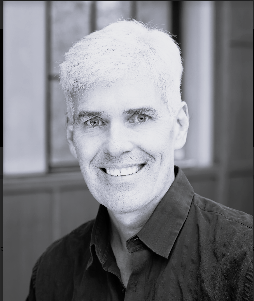
Stephen Rumph has sung leading tenor roles throughout the Puget Sound area and beyond. Recent credits include Faust (Mefistofele) and Hoffmann (The Tales of Hoffmann) with Pacific Northwest Opera, with whom he will perform Belmonte (The Abduction from the Seraglio) this spring; Edgardo (Lucia di Lammermoor), Eistenstein (Die Fledermaus), and Danilo (The Merry Widow) with Tacoma Opera; and Father in Together (Seattle Opera Creation Lab). Concert work includes Beethoven’s Ninth Symphony with the Seattle, Tacoma, Spokane, and Bozeman Symphonies and Mozart’s Requiem
with Northwest Sinfonietta, Bellingham Chamber Chorale, and Thalia Symphony. He is chair of music history at the University of Washington and the author of Beethoven After Napoleon (2004), Mozart and Enlightenment Semiotics (2011), and The Fauré Song Cycles (2020).

Seattle-based lyric baritone Darrell J. Jordan has been praised for his
“shining, beautiful voice” (Broadway World), his “expressive baritone and facial expressions” (The SunBreak), and has been called “the star of the show” (Columbia Heart Beat). His recent solo concert engagements have been with Amherst Early Music Festival, Odyssey Chamber Music Series, Rolla Choral Arts Society, Choral Arts Alliance of Missouri, Missouri Symphony, Southside Philharmonic Orchestra, Toledo Symphony, Thalia Symphony, Olympia Chamber Orchestra, Salt Water Music Series, Seattle Art Song Society, Harmonia Orchestra, and Seattle Choral Company. For more information, please visit: www.DarrellJJordan.com.
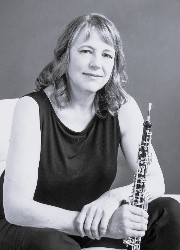
Janet Putnam plays principal oboe in the North Corner Chamber Orchestra, an unconducted orchestra in Seattle, and freelances in the major Seattle/Tacoma area orchestras. She has played solo oboe, English horn, and oboe d’amore as sub/extra with the Seattle Symphony, oboe and English horn in
179 Nutcrackers with the Pacific Northwest Ballet. She solos frequently with Seattle choirs and performs with Zubatto Syndicate, a jazz ensemble.
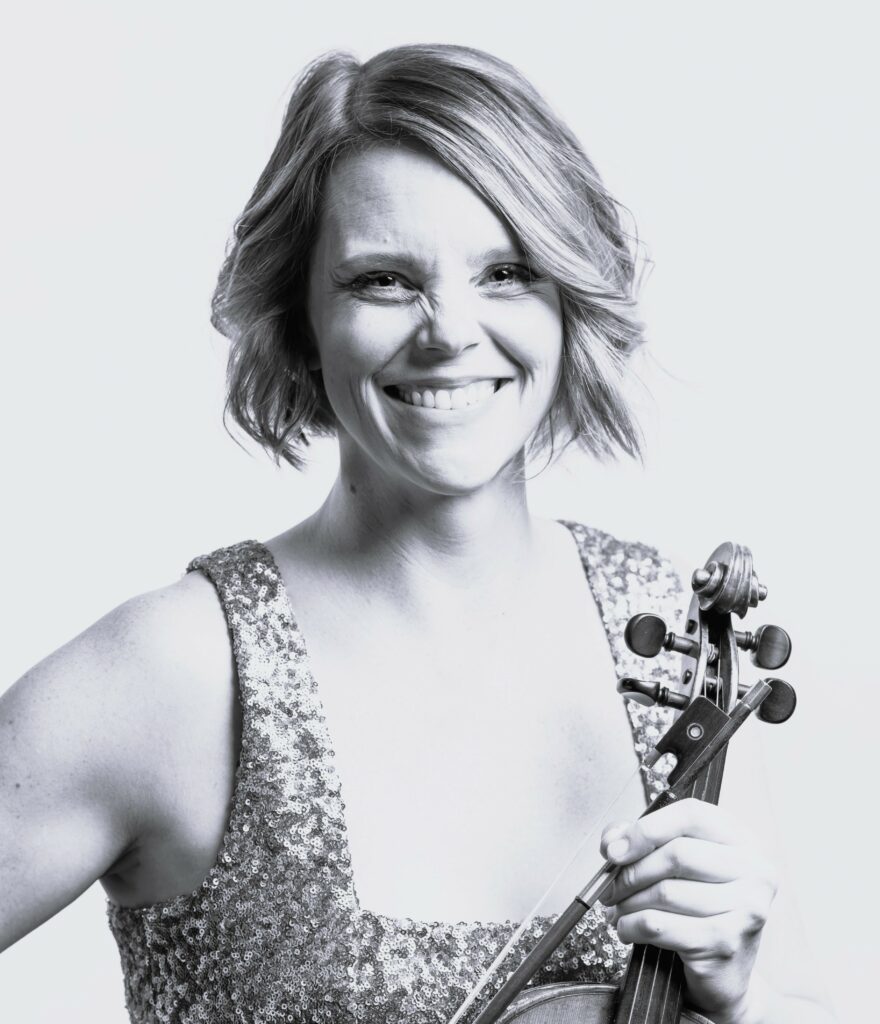
Dawn Posey maintains an active and varied performing, teaching, and coaching career. She is currently Concertmaster of the Bellingham Symphony Orchestra in Bellingham, WA and Assistant Concertmaster of the Northwest Sinfonietta in Tacoma, WA. She also teaches violin and coaches musicians of all instruments. A devotee of baroque performance practice, Dawn has been a frequent guest artist with Chatham Baroque, including tours to Ecuador and Los Angeles. In 2015, she participated in the world-renowned training program, Tafelmusik Baroque Summer Institute. Dawn is a founding member of Kassia Ensemble, a chamber ensemble made up entirely of female performers and seeks to empower women through quality performance, collaboration, diverse programming, and outreach. Dawn currently lives in Seattle, WA where she is a frequent substitute with the Seattle Symphony. She also continues to perform with Kassia Ensemble and other chamber ensembles. For more information please visit www.poseyviolin.com.
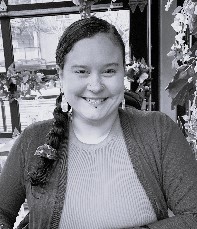
Kimberly Rosenberg is a violinist and violist from the Seattle area with a passion for theatre and chamber music. She received her Bachelor of Music with Honours from The Royal Academy of Music, London, UK in 2011 and was a member of Southbank Sinfonia’s 10th anniversary year. Whilst in London, she performed as part of an on-stage string quartet, alongside actor Alex Jennings, in the West End production of, “Hymn” by Alan Bennett and was invited to be the sole violist in London Sinfonietta Academy’s debut year. Kimberly currently lives in Seattle as a freelance musician, where she can often be found playing at 5th Avenue Theatre, Auburn Symphony, Paramount Theatre, Seattle Music Inc, and with various chamber groups. When she’s not performing, Kimberly loves to spend her time playing computer games with her husband and showing her Glen of Imaal Terriers in dog shows.
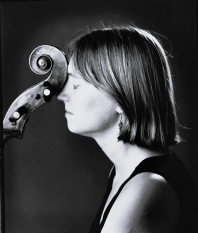
Laura Kramer has a DMA in historical performance practice from
Cornell University and has performed extensively as a soloist and chamber musician on baroque and modern cello. She has served as continuo and solo cellist with the Pacific Baroque Orchestra, both in Vancouver B.C. and on tours throughout eastern and western Canada. She has also performed with the Seattle Baroque Orchestra and in New York as part of NYS Baroque, the Grande Bande and Glimmerglass Opera. Laura enjoys performing with many choral groups in the Seattle
area, including Seattle Bach Choir, Mirinesse Women’s Choir, Bellevue Chamber Chorus and Vespertine Opera.
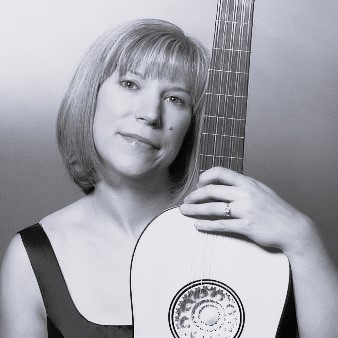
A specialist in standard classical guitar as well as various early guitars and lutes, Elizabeth C. D. Brown is a very active performer in the United States. Highlights from recent seasons include performing at the Music by Women Festival and Northwest Guitar Festival, performing concertos by Vivaldi and Sierra and premiering a new work for guitar and orchestra with the Seattle Symphony. She has performed in operas by Purcell, Blow, Paisiello, Rossini and Verdi, as well as all of Monteverdi’s surviving operatic works. Elizabeth’s first solo recording, La Folia de España: Dances for Guitar has been praised for its “…apparently effortless ease.” (Lute News, UK) Her second solo recording, In Her Honor, includes music from the Princess [Queen] Anne Guitarbook and the Elisabeth of Hesse Lutebook, as well as her own arrangements of works by Elisabeth Jacquet de la Guerre. She is head of the Guitar and Lute program at Pacific Lutheran University and has taught at Cornish College of the Arts and Seattle Pacific University. See her on YouTube at www.youtube.com/user/ElizabethCDBrown or
for more information visit: www.elizabethcdbrown.com.
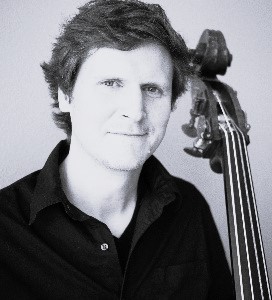
Ross Gilliland performs regularly on modern and baroque bass and violone throughout the Pacific Northwest. He performs locally with period ensembles including the Seattle Baroque Orchestra, Portland Baroque Orchestra, Sound Salon (formerly Byron Schenkman & Friends), the Whidbey Island Music Festival, Epiphany Parish, Tacoma Bach Festival, and Seattle Bach Choir. He also performs regularly on modern bass with numerous ensembles including the North Corner Chamber Orchestra (NOCCO), Seattle Modern Orchestra, Pacific Northwest Ballet, Auburn Symphony, Seattle Chamber Orchestra, and the Seattle ‘Candlelight Concert’ series. He is also active freelancing in theater and studio sessions, recording soundtracks for feature films, pop, bluegrass, video games, and other ‘attractions’. A Madison, WI native, Ross has been a long-time and continuing performer with the Madison Bach Musicians, the Token Creek Chamber Music Festival, collaborating closely with famed composer and Bach interpreter John Harbison, the Madison Symphony Orchestra, Wisconsin Chamber Orchestra, and the Bach Dancing and Dynamite Society. He has been a featured soloist with Seattle’s Mostly Nordic concert series and live on Wisconsin Public Radio. Mr. Gilliland holds degrees in music
performance, physics, and environmental policy.
